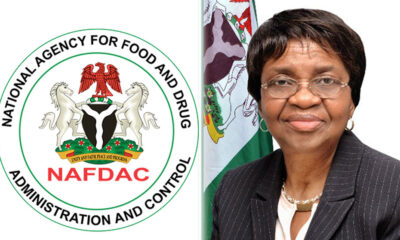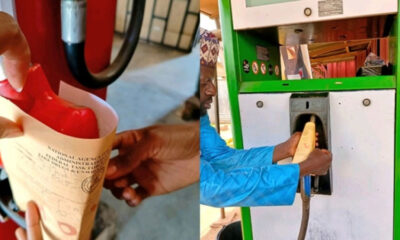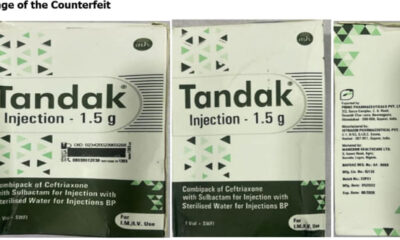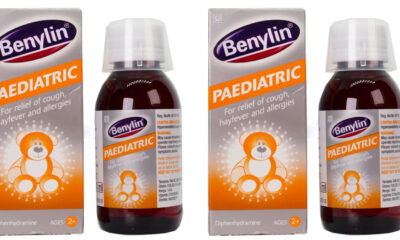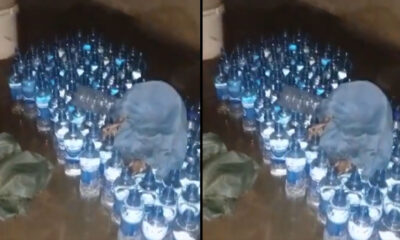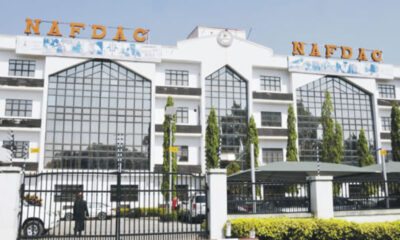Lagos govt to empower one million youths with ICT skills
News
NAFDAC uncovers warehouse stocked with banned imported soaps in Lagos
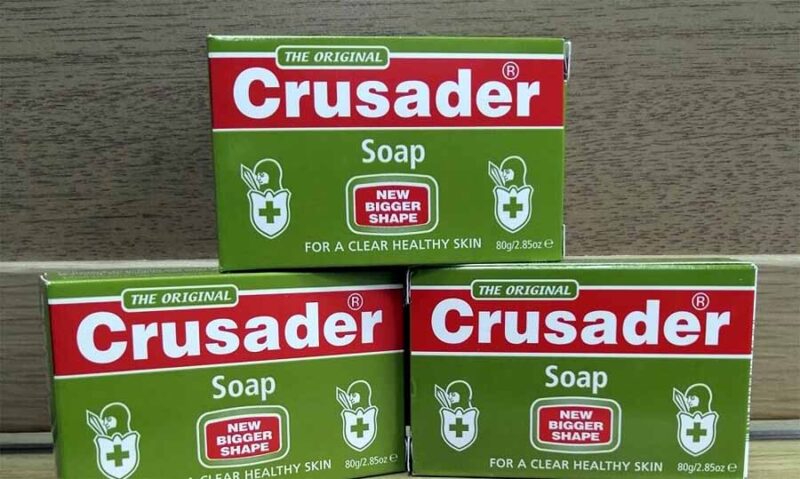
NAFDAC uncovers warehouse stocked with banned imported soaps in Lagos
The National Agency for Food and Drug Administration and Control says it has discovered a warehouse in Lagos stocked with imported banned Crusader soaps.
Speaking on Friday at a media conference in Lagos, Mojisola Adeyeye, NAFDAC director-general, said investigation through the ports has shown that the banned Crusader soap was imported seven times in 2021 alone with each consignment containing 4,500 cartons of the soap.
Adeyeye said the importation of the soap into the country was banned by NAFDAC years ago because it contains mercury which has been identified as a health risk.
“Acting on intelligence, I&E directorate in August 2023 busted a warehouse in trade fair market, which was filled with banned imported soaps,” she said.
“Three trailer-loads of imported Crusader medicated soap and Mekako soap totalling 4,000 cartons by 12 packs by 12 tablet soap were evacuated from the warehouse, while some suspects were arrested in connection with the case.”
“The street value of the evacuated products is approximately N1 billion.
“Mercury and its compounds in cosmetics are a threat to public health. Mercury is readily absorbed through the skin into the bloodstream and exerts a debilitating effect on the vital internal organs of the body.
“The Minamata Convention on Mercury is a global agreement, which was adopted in 2013 and entered into force on the 16th of August 2017.
READ ALSO:
-
Someone wants to blackmail me with my private video — Lizzy Jay (Omo Ibadan) cries out
-
UK hikes student’s visa to N476,667, raises fee for visitors
-
Kogi’ll witness new era under my administration – Melaye
“The Minamata Convention bans the sale of mercury-added cosmetics, including skin-lightening creams. After 2020, parties to the convention, including Nigeria which is a signatory to the convention, are required to have banned the manufacture, import and export of mercury-containing cosmetics products.”
Adeyeye said during interrogation, one Peter Obih (alias Ogbuagu), the prime suspect, claimed to have bought the product from a company.
She added that the suspect presented an expired NAFDAC certificate that was issued for local manufacturing of the product after the ban in Nigeria.
“It is to be noted that not one bar of the soap has been manufactured in Nigeria since the purported registration in 2013,” the NAFDAC DG said.
“The suspect claims to have just secured a contract manufacturing agreement with a local manufacturer but they are yet to commence production.
“The sample of the product was taken to our laboratory for analysis and was found to contain heavy metals identified as Mercury. The Crusader soap is falsely labelled, made in England to deceive Nigerians while the actual source is India.
“This act is an outright violation of the NAFDAC Acts and a contravention of the agency’s regulations, including the cosmetic products (prohibition of bleaching agents) regulations 2019.
“The arrested suspects will be charged to court while a manhunt is currently being intensified to arrest other fleeing members of this deadly syndicate.”
NAFDAC uncovers warehouse stocked with banned imported soaps in Lagos
News
Lagos govt to empower one million youths with ICT skills
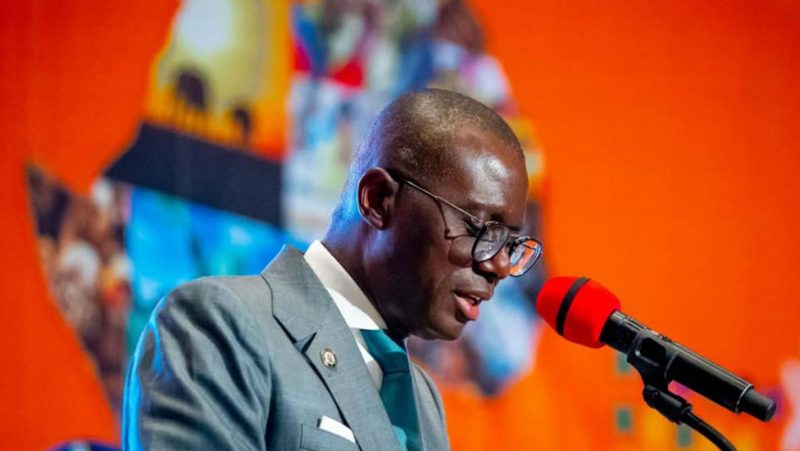
The Commissioner for the Ministry of Youth and Social Development, Mobolaji Ogunlende, made this known on Wednesday, in Ikeja.
News
We will sanction teachers engaging in extra lessons after school – LASG

We will sanction teachers engaging in extra lessons after school – LASG
The Lagos State Government has threatened to wield the big stick against any teacher or school that continues to utilise the extra one-hour after the official closing hour for extra lessons, for which they are paid by pupils.
Commissioner for Basic and Secondary Education, Jamiu Tolani Alli-Balogun dropped the hint while inaugurating the block of classrooms and furniture at the Amuwo-Odofin Junior High School Complex, donated to the state by Grimaldi Group and the Ports &Terminal Multiservices Ltd.
He said the extra hour is meant for extra-curricular activities, and students must be encouraged to participate in some of these social activities and clubs such as the Red Cross, Red Crescent, Boys Scout, Boys/Girls Brigade, the STEM Club, Writing and Debate Club and many others, to ensure their rounded development.
He frowned at the practice where the first lesson in many public schools across the state are often “killed” by teachers, and threatened to deal decisively with any teacher caught for dereliction of duties.
“Do your job at the right time between 8am -2pm, leave the extra hour either for reading or extra-curricular activities. We would no longer condone using that time for fee-paying extra lesson in our schools. Education is free in Lagos State and nobody should be charging any fee for anything,” commissioner said.
Saying the projects has changed the face of Mile 2 Community and added value to education in the state, Alli-Balogun said the state would not only take ownership, but will maintain the facilities to ensure that it serves the purpose of learning and add value to community and the state.
Other infrastructure donated to the school by PTML include: an access road with drainage system, a borehole and installation of a water treatment plant at the Amuwo-Odofin Junior and Senior High Schools, a security gate and well-furnished gate house at Amuwo-Odofin Junior and Senior High School Complex, 1,000 dual desks and chairs as well as chairs and desks for staff rooms for all the six schools within the school complex, roof repair of Amuwo-Odofin Junior and Senior High School and Imoye High School and a 50 KVA transformer donated to Senior and Junior High School, Mile 2.
READ ALSO:
- La Liga President confirms Mbappe to Real Madrid move
- Five arrested for operating illegal refinery in Rivers
- Kano govt bans male DJs from female events
Addressing the school principal, the Commissioner said: “If you have shortage of teachers, kindly let us know, so that we can deploy more teachers to this school for it to serve the purpose for which it was built.”
He applauded the PTML for putting smiles on the face of the students and residents of the community as well as the government. Noting that the government cannot do everything, Alli-Balogun said partnerships like this ensures that companies give back to the state and the host communities, adding that investing in the future generation of Amuwo-Odofin and the state is an investment in the right direction.
The Permanent Secretary in the ministry, Abayomi Abolaji threw his weight behind PTML for delivering on its CSR. He said the Babajide Sanwo-Olu administration is determined to ensure that no child is left behind.
News
Corruption: Like AfDB, World Bank blacklists 58 Nigerian firms, individuals
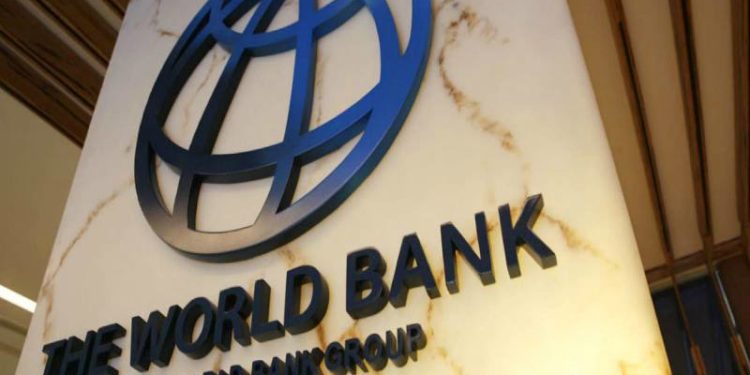
Corruption: Like AfDB, World Bank blacklists 58 Nigerian firms, individuals
The World Bank has blacklisted 58 Nigerian companies and individuals for engaging in corrupt practices, a move which comes as part of the institution’s ongoing efforts to uphold integrity and transparency in its projects and operations.
Among those affected are 39 Nigerian companies previously debarred by the African Development Bank (AfDB), along with 19 individuals identified by the World Bank under the cross-debarment policy.
The total number of debarments now stands at 58, rendering the implicated entities ineligible to participate in projects and operations financed by institutions of the World Bank Group.
The list which the World Bank updates every three hours, contains a total of 1,210 companies and individuals globally at the time of this report.
A debarment renders firms/individuals ineligible to participate in projects and operations financed by institutions of the World Bank Group.
According to the World Bank report, the sanctions were imposed following an administrative process conducted by the Bank, which allowed the accused firms and individuals to respond to the allegations. This process adhered to the Bank’s procedures for sanctions proceedings and settlements in bank-financed projects.
READ ALSO:
- Dollar crashes against Naira at official market
- Reps invite Ribadu over faulty presidential air fleet
- What autopsy revealed on cause of Mohbad’s death – Pathologist
“Through July 2007, this process was conducted in accordance with the Sanctions Committee Procedures adopted on August 2, 2001. The process is currently conducted in accordance with Bank Procedure: Sanctions Proceedings and Settlements in Bank Financed Projects. For more information on the two-tier sanctions process go to Sanctions,” it stated in the report.
Cross-debarment in accordance with the Agreement for Mutual Enforcement of Debarment Decisions dated 9 April 2010, which, as of July 1, 2011, has been made effective by the World Bank, Asian Development Bank, European Bank for Reconstruction and Development, Inter-American Development Bank, and African Development Bank.”
In addition to debarment, the Bank reserves the right to apply other actions to firms and individuals found in violation of its policies, which may not necessarily result in debarment.
The prohibited conduct leading to debarment is defined in the applicable Procurement or Consultant Guidelines, as well as in the World Bank Procurement Regulations for Investment Project Financing Borrowers. The specific guidelines may vary depending on the nature of the project in question.
The World Bank’s actions underscore its commitment to combating corruption and promoting accountability in development projects, ensuring that funds are used effectively for the benefit of the people.
Corruption: Like AfDB, World Bank blacklists 58 Nigerian firms, individuals
-

 Business2 hours ago
Business2 hours agoDollar crashes against Naira at official market
-

 International3 days ago
International3 days agoUpdated: Three years after separation, Melinda resigns as co-chair of Bill & Melinda Gates Foundation
-

 News3 days ago
News3 days agoTragedy strikes as Customs officer kills self in Abuja
-
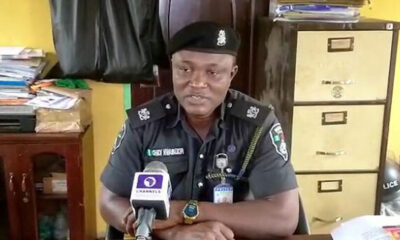
 metro2 days ago
metro2 days agoEdo community attacked, houses razed, 8 cars burnt
-

 Sports2 days ago
Sports2 days agoTottenham will go all out to beat Manchester City – Postecoglou
-

 metro1 day ago
metro1 day agoNigerian who killed wife in UK bags life jail
-

 Entertainment3 days ago
Entertainment3 days agoKorra Obidi faces backlash for Hawaii trip after receiving $50,000 in donations
-

 Education2 days ago
Education2 days agoBREAKING: ASUU threatens fresh nationwide strike over federal varsities’ condition

